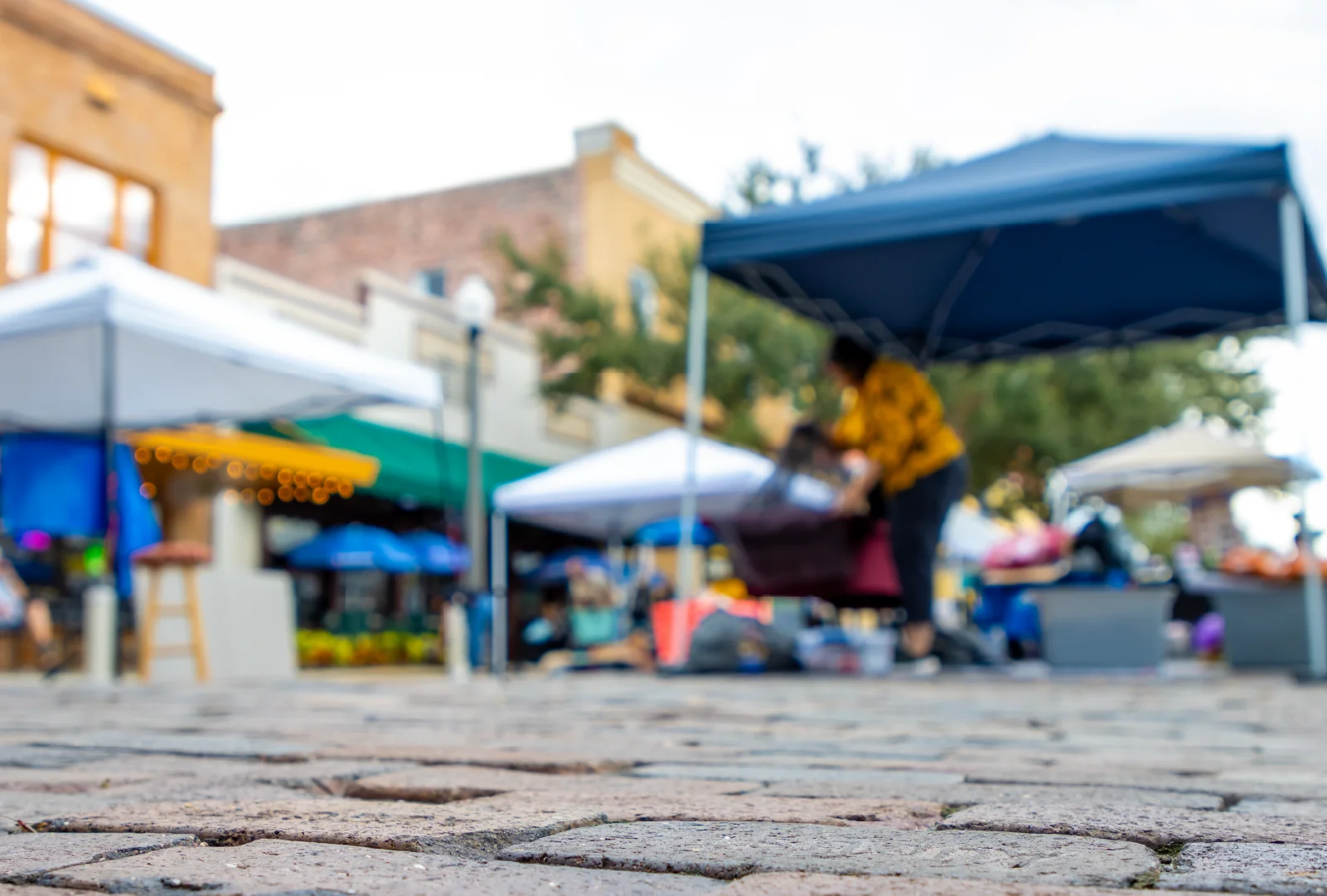Your booth is a work of art. But is it safe?
All the hours spent creating your pieces and arranging your displays just right can be undone in an unfortunate instant if you don’t prioritize safety at your booth.
Ahead, get simple, actionable vendor safety tips to protect your business and your customers. Plus, find out the single most important thing you can do today to keep your financial future picture-perfect.
Starting or growing an arts and crafts business? Here’s more essential info!
Common Safety Gaps You Could Be Overlooking
You might think your arts and crafts booth is set up well enough, but the truth is, you’re at risk of all kinds of accidents whenever you attend an event. Here are some common safety gaps to watch out for:
- Unstable displays: Your products, tables, or shelving can collapse and cause injury
- Trip hazards: Power cords, uneven ground, or loose rugs can cause a customer to fall
- Product Liability: Sharp edges? Allergic reactions? Even seemingly safe items can cause harm
- Weather vulnerabilities: Wind or heavy rain can cause a booth to collapse or blow over
- Lack of emergency prep: It’s crucial to have a fire extinguisher, first aid kit, and exit plan in place
A Real-Life Nightmare for Arts and Crafts Vendors
Imagine this: Your new products are carefully displayed under a white tent. The anticipation of killer sales ahead! But then, a fierce storm unleashes terror on your event, coming through like a “freight train,” leaving only destruction behind.
It’s what happened to arts and crafts vendors at the Stowe Foliage Arts Festival in Vermont in October 2024. Severe winds flattened the main tent, which contained the work of more than 80 artists, destroying thousands of dollars’ worth of arts and crafts merchandise.
No one ever expects to face a tragedy like this — that’s why it’s essential to stay prepared just in case those unthinkable moments happen in real life.
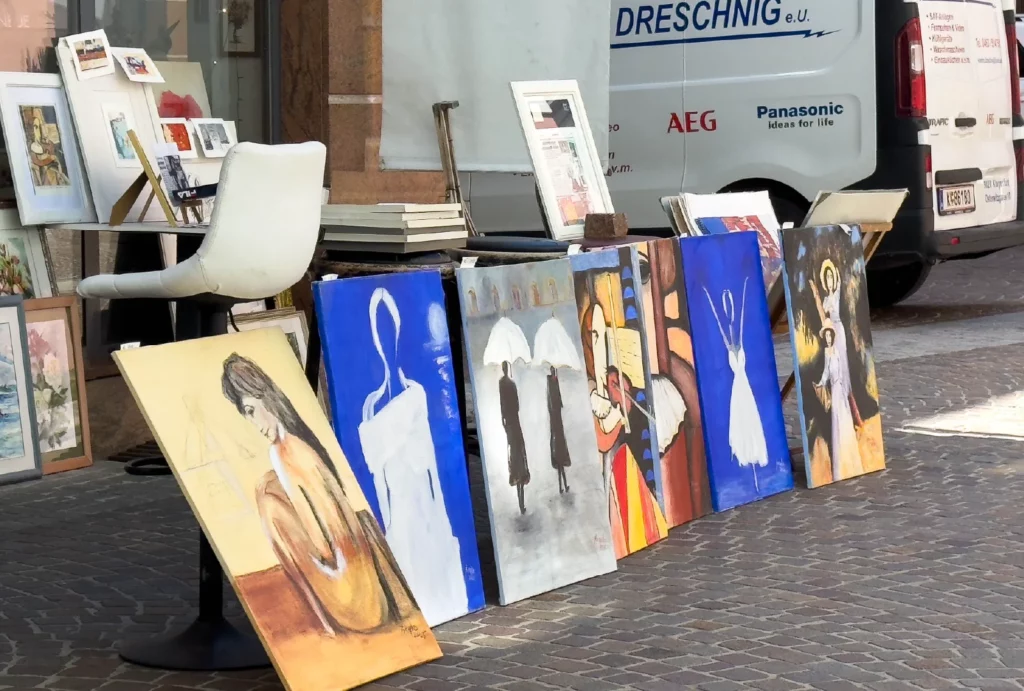
Risk Management for Vendors: 17 Practical Tips
Just like you might fire a ceramic glaze or add a glossy varnish to a piece, safeguarding your business with these vendor safety tips should be the finishing touch when you attend events.
Here are industry-approved tips for staying safe as a creative vendor.
Start With the Event Rulebook
1. Follow the event rules. Your first safety checkpoint is the event rulebook. Every show has unique specifications on booth size, material, placement, and even the kinds of weights you can use.
Be sure to follow these to a T — otherwise, you can be fined or asked to leave mid-event because your setup doesn’t meet the specifications. Plus, staying compliant gives you an extra layer of protection in case of a lawsuit.
Set Up Your Booth
2. Keep signage out of the way. Place your signs high enough so no one walks into them and hang vertical banners out of the main traffic path. Check the materials, too — some events ban certain types for safety reasons. You want your banding to be a knockout, but not literally!
3. Secure your tent against the weather. Say it with me, “No cinder blocks!” Depending on the event’s grounds, use approved weights (like 60-pound sandbags on each corner) or stakes to ensure your tent stays put in strong winds.
Another option is to invest in a canopy tent with air vents, which gives the wind a path to flow through, reducing the chances of your tent lifting fully and exposing your business to the elements.

4. Choose flameproof tent material. Even if it’s not required, a fire-retardant tent can protect you from nearby fire hazards if your neighboring vendors sell candles or run a cooking station. Flames can jump quickly, and you don’t want your products to feel the heat if you can help it.
5. Secure side walls. Some events require side walls as extra protection from harsh weather, so if you’re using these, make sure they are properly secured. Side walls should be attached from the top and sides with fasteners (like zippers or hook-and-loop straps), and sometimes at the bottom with included stakes.
Side walls can defend your displays from wind and rain — but if you overlook installation, they can become a liability and fly into customers or your products.
6. Double-check your flooring. If you use foam or padded flooring to make your space more comfortable or to stand out visually, ensure all the pieces fit together firmly, with no raised edges. A lifted corner can easily catch a customer’s shoe and send them flying.
Go for smooth, non-slip surfaces that are friendly for everyone, especially people using canes or wheelchairs.
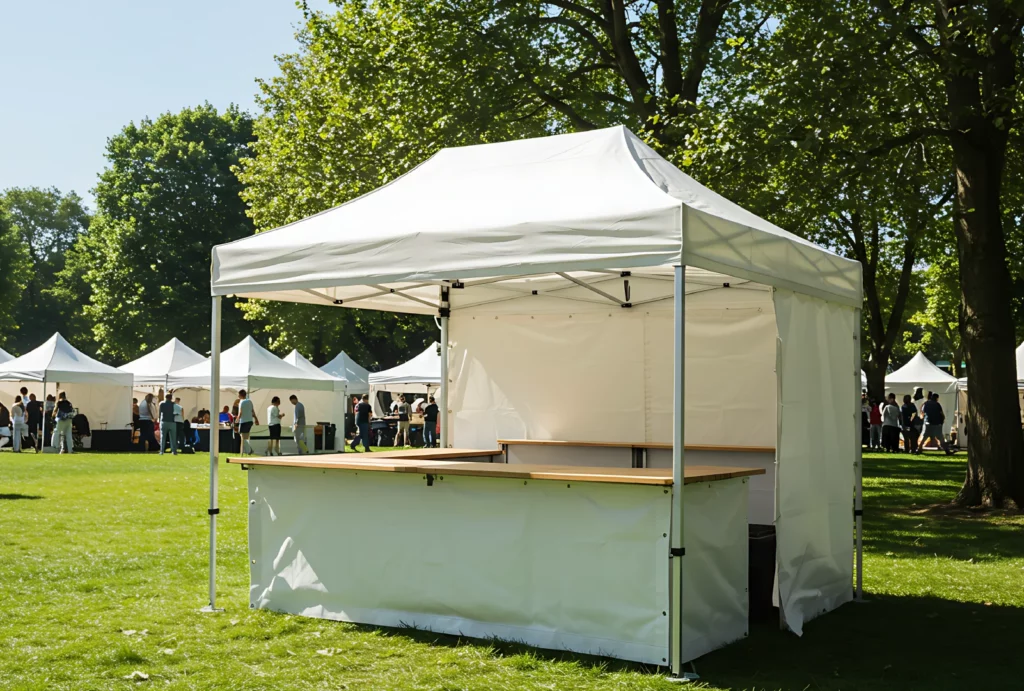
Watch for Electrical and Equipment Hazards
7. Reroute extension cords. It may be tempting to simply tape a cord to the asphalt and call it good, but that doesn’t remove the trip hazard! Go the extra step and route cords behind tables, along the sides of your tents — anywhere a customer wouldn’t reasonably walk across.
In addition, it’s smart to invest in proper cord covers with visibility stripes so they’re easier to spot.
8. Inspect equipment beforehand. Check all your electrical tools and devices, like glue guns, power banks, portable fans, or card readers, to make sure they’re working properly. Inspecting for frayed cords or malfunctions beforehand saves you a headache later.
Don’t skip lighting, either! Your lanterns, LED string lights, or display lamps can all potentially overheat and cause problems, so ensure they’re in good working condition before opening up shop.
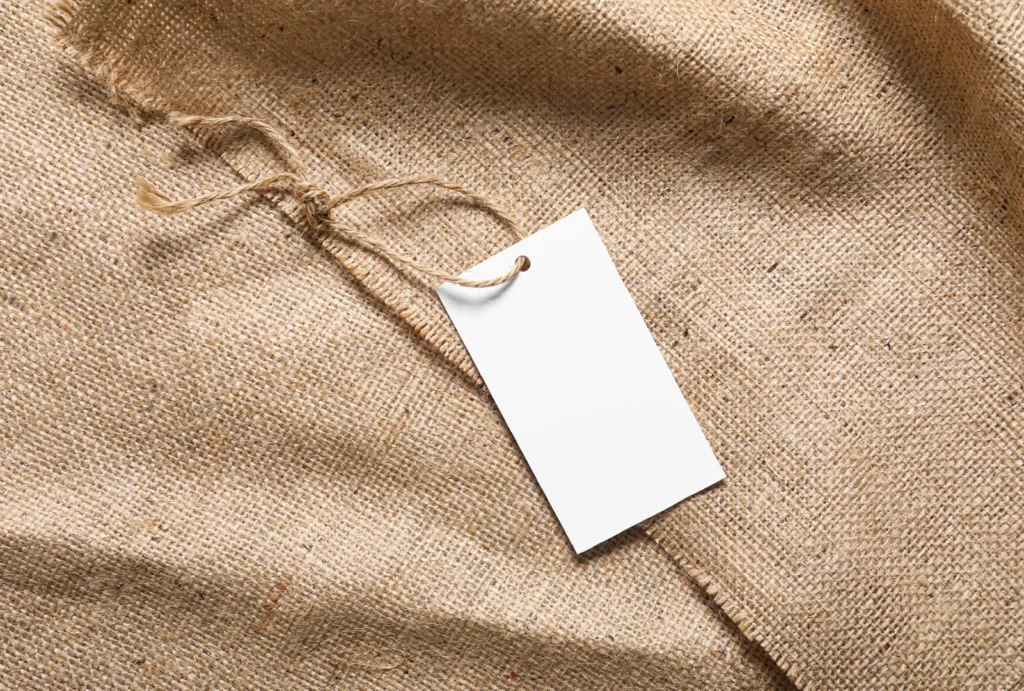
Ensure Product Safety
9. Label Potential Allergens and Intended Use. If you sell products with common allergens or items that can potentially be misused, make it crystal clear on the packaging what’s inside and how they should be used.
Did you know that if someone claims your product hurt them somehow, your business can be held financially responsible for those damages? This is called product liability, and labeling your products properly plays a significant role in averting instances like these.
Pro Tip: No matter how careful you are, your creations can cause expensive problems down the road. Learn more about arts and crafts product liability and what it means for your business.
10. Take extra precautions with sharp or fragile products. Do your arts and crafts pieces require gentle handling or have parts that can easily injure someone? Think sharp edges, rough spots, or large/heavy items. These need to be displayed carefully.
- Add protective wrapping to sharp points, edges, or rough pieces
- Place products at a higher level, so they’re out of reach from curious kids
- Block off breakable products so customers can only view them from further away
- Ensure large/heavy items are securely displayed so they don’t tip over and injure anyone
Keep Your Space Tidy
11. Perform regular safety sweeps. The flooring you carefully put together? Popped up in one spot. The extension cord you routed away from the crowds? Kicked into a precarious position!
Keeping your booth safe requires constant vigilance, so set an alarm for every hour to remind yourself to check for hazards throughout your shift.
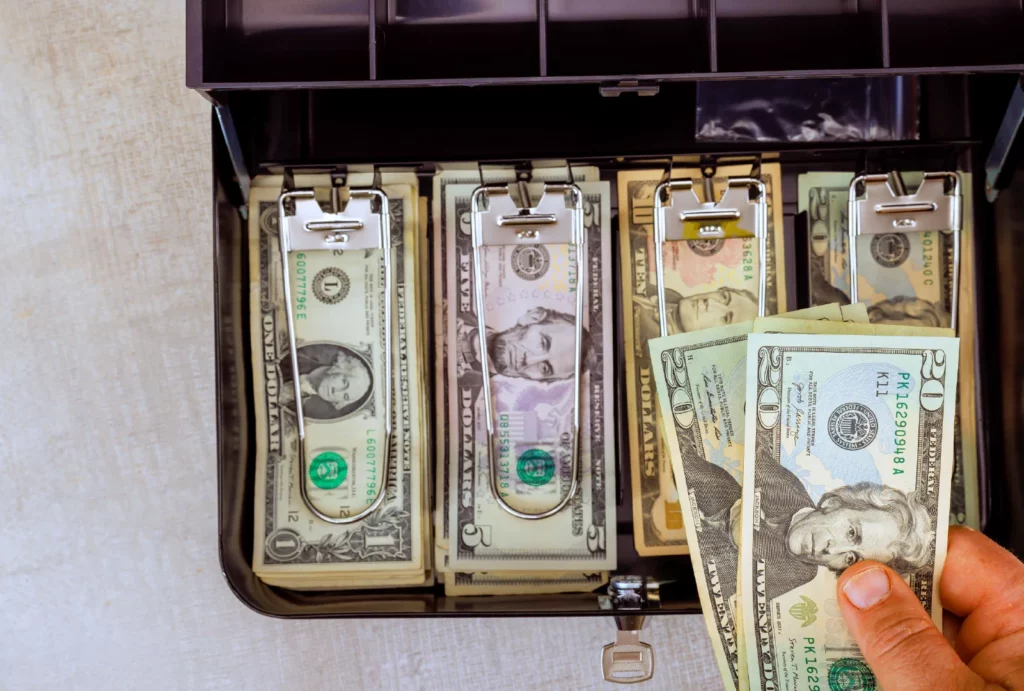
Prioritize Personal Safety
12. Secure your cash and valuables. Use a lockable cash box you can keep eyes on at all times, or wear a money belt so cash stays on your person. Don’t leave your booth unattended, even just for a quick bathroom break — your business tablet or other tech left out in the open can look very tempting to a thief.
If possible, limit cash handling in plain sight. Try to shield yourself with a display or a tent wall when you accept cash or give change to avoid attracting unwanted attention.
13. Work with a buddy. Running an arts and crafts booth on your own is hard, so partner up with a fellow vendor (someone you know and trust) who can watch your booth if you need to step away, especially during setup and breakdown.
Having a vendor safety buddy is crucial, particularly as you transport your inventory to and from your vehicle. They can also be a good gut check if someone or something feels off and help avoid unsafe situations simply by being present.
Establish a safety signal with neighboring vendors, like a discreet hand gesture, to communicate that you need help without alerting the potential threat.
14. Share your brand story, not your personal info. It’s easier to make a sale when you connect with customers, but that doesn’t mean you need to tell people you’re working alone or where you’re staying. Be courteous, but limit how much personal information you offer to strangers. Instead, focus on telling your brand story and how much love you put into your art!
Prep for Emergencies
15. Keep a first aid kit handy. Minor injuries can happen to you or your customers anytime, so be ready to handle them quickly with a stocked first aid kit.
A general rule: remember not to admit fault for accidents like these, because if a customer comes back with a general liability claim, it may snowball into something more serious and more expensive to get squared away.
Pro Tip: Why do events require you to carry insurance? For starters, customer injuries are a big part of it. Learn more: Need-to-Know Insurance Info for Art Fairs.
16. Know your emergency plan. Every fair, market, and festival is different, so familiarize yourself with the event map so you know the quickest way to safety in case of fire, severe weather, or other emergencies.
Other things to keep on hand:
- A fire extinguisher
- Your mobile phone
- The event organizer’s contact information
- The event security team’s contact information
17. Be OK with packing up early. Ultimately, no sale is worth your safety. If weather conditions turn dangerous — think winds, lightning, or flooding — or if you feel unsafe due to crowd behavior, it’s okay to cut your losses and pack up.
Vendors sometimes stay because they don’t want to miss out on sales, but an injury or damaged booth can cost far more than a few missed transactions. Trust your instincts and err on the side of caution if things start to look rough.
Thinking about reducing risk beyond events? Check out our Free Risk Assessment for Artists and Crafters.
Theft Happens. At the Bite of Seattle Festival in Washington state, vendor Courtney Leanne was shocked to find her booth ransacked overnight, with thousands of dollars’ worth of original artwork and equipment stolen. Her advice: “Definitely don’t leave your merchandise in your tent, at least the stuff that is of value. Lock it up, bring it with you. Maybe have some kind of camera in your tent to follow overnight.”

Bonus Tip: Protect Your Vendor Business Financially
Here’s the most crucial vendor safety tip we can share with you.
18. Carry vendor liability insurance to financially protect your arts and crafts business — it’s the number-one thing you can do to stay safe from costly claims of customer injury or property damage.
No matter how many safety checks you do as a vendor, you can’t eliminate risk completely. That’s where vendor insurance comes in; it kicks in to cover expenses for mishaps and accidents that happen anyway, so you can keep your business running smoothly.
ACT Insurance: Crafted for Peace of Mind
ACT Insurance is designed for artists, crafters, and creators of all kinds. With two convenient online policies, ACT Pro and ACT Go, you can get customizable coverage for just one event or a full year!
ACT Pro
- General and product liability insurance
- 365 days of continuous coverage
- Meets most event insurance requirements
- Instant Certificate of Insurance (COI)
- Optional Theft & Damage Coverage
- Plus more optional coverage add-ons
ACT Go
- General liability insurance
- 1-3, 7, or 90 days of coverage
- Meets most event insurance requirements
- Instant Certificate of Insurance (COI)
- Optional Theft & Damage Coverage
FAQs About Protecting Your Vendor Business
How Can Vendors Protect Their Merchandise at Outdoor Events?
Never leave your merchandise unattended, and opt for lockable display cases and weatherproof storage containers. Set up your tent securely to protect products from weather elements like rain or wind.
Why Is Vendor Liability Insurance Important for My Business?
Vendor liability insurance is essential because it’s designed to cover claims if a customer is injured or property is damaged at your booth. It helps protect your business from financial loss so you can keep it running with minimal interruption.
What Type of Insurance Do Vendors Need for Events?
For events, you typically need general liability, product liability, and theft and damage coverage for comprehensive protection in case of customer injuries, product-related damages, or loss of the things you need to run your business. All available on ACT Pro!

